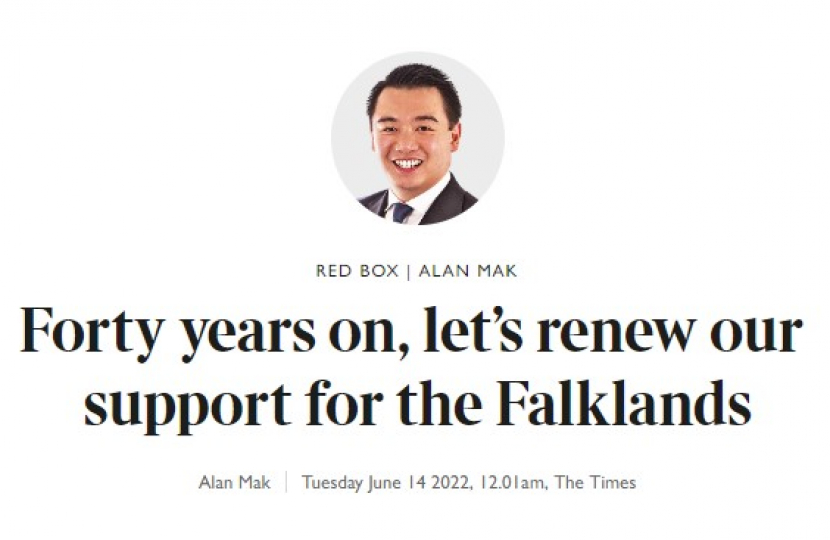
Local MP Alan Mak has written for The Times' Red Box. Read his article below:
Forty years on, let’s renew our support for the Falklands
Alan Mak Tuesday | June 14 2022, 12.01am, The Times
On 2 April 1982, Argentine forces illegally invaded and occupied the Falkland Islands, a British Overseas Territory, some 8,000 miles from the UK in the middle of the South Atlantic. After 74 days of war, during which 255 members of the UK armed forces and three Falkland Islanders lost their lives, islanders celebrated their liberation.
Today, 40 years on from that original Liberation Day, islanders will gather to celebrate their freedom and give thanks to those who liberated them. Here in the UK, veterans and the families of those who lost their lives in the war will also gather at war memorials across the country and at the National Memorial Arboretum where the national commemoration is taking place, organised by the Royal British Legion.
As the MP for a constituency near Portsmouth naval base, and which is home to many Falklands veterans, I know the one thing they all talk about is the gratitude of the islanders and the incredibly warm welcome they receive whenever they return to the islands. Veterans returning for the first time in 2022 will receive just as warm a welcome as that received by those who went back in the immediate aftermath of the war.
Over the last 40 years, the islanders have worked hard to demonstrate that they have not wasted the freedom that was won for them. The Falklands of 1982 has been transformed. Today, the Falkland Islands are internally self-governing and self-sufficient in all areas apart from defence. Their relationship with the UK is a modern and mutually beneficial partnership based on the principle of self-determination.
Having visited the Falklands, I know islanders enjoy a good quality of life, with growing resources devoted to health, education, and preserving and enhancing the environment. The population of the islands is now 3,200, roughly double what it was in 1982. With growth comes diversity, and 60 different nationalities now make up the population of the Falklands.
None of these positive developments would have been possible without the sacrifices of so many in 1982.
However, it seems that a growing number of younger people are unaware of all of this. A recent survey undertaken by Help for Heroes found that more than a quarter of those aged 18 to 24 had never heard of the conflict, whilst nearly half of those aged 18 to 34 did not know in which decade the Falklands War took place. These findings are deeply worrying.
The positive story of the liberation of the Falklands, the achievements of the islanders over the last 40 years, and the UK’s continued support for islanders’ right to self-determination, including the ongoing presence of UK forces in the islands today, should make all of us in the UK proud. In parliament, there is strong cross-party support for the islanders’ right to self-determination, and it forms a key part of UK foreign policy, no matter who is in government.
As Liberation Day is marked in the islands and across the UK, we should remember and give thanks to all those who died in the liberation and those who still bear the scars of that conflict to this day.
We should also remember that the threats to the Falkland Islands and in particular the islanders’ right to self-determination have not gone away, despite the passage of time.
In doing so, we send a message that a new generation of Westminster politicians is equally determined to ensure that the sacrifices made during those dark days in 1982 are not forgotten and that the islanders’ right to self-determination will be respected and defended. This Sunday, for example, I am organising a parade in my constituency for Falklands veterans, and I know other parliamentarians will be attending similar events across the UK.
The Help for Heroes survey also reminds us that there is work to be done outside Westminster with a new generation of UK citizens. All parliamentarians should work to ensure that the events of 1982 and the positive development of the Falklands over the last 40 years are understood by more young people in Britain.
If we are successful, we will have created a lasting legacy from this 40th anniversary year as a new generation of UK citizens, not just politicians, commits to supporting the veterans of the Falklands War, to celebrating their achievements and those of the islanders, and to supporting and defending the right of self-determination for all those who call the Falkland Islands home.


